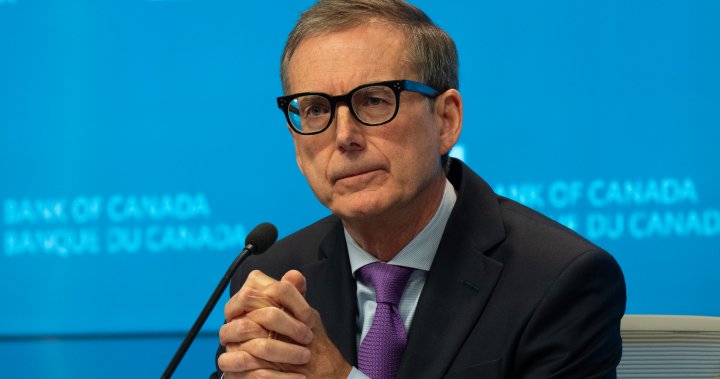The Bank of Canada’s efforts to tame inflation by raising interest rates are at odds with the projected pace of government spending, says governor Tiff Macklem.
Macklem spoke to reporters on Wednesday after the Bank of Canada opted to keep its benchmark interest rate steady for the second consecutive decision.
That hold comes despite new forecasts from the Bank of Canada that inflation will be higher in the near term than initially expected, though monetary policymakers still expect annual price pressures will cool to the central bank’s two per cent target by mid-2025.
Macklem was asked what impact government spending plans are having on the path for inflation. He reiterated that fiscal policy is the purview of elected officials, and that the central bank’s role there is only to bake government spending plans into its forecast.

But citing the Bank of Canada’s latest outlook, Macklem said that based on the current spending plans in the budgets of all federal and provincial governments, fiscal spending is expected to grow at a rate of 2.5 per cent next year.
“So what that means is if all those spending plans are realized, government spending will be adding to demand more than supply is growing,” he said. “And in an environment where we’re trying to moderate spending, get inflation down — that’s not helpful.”
Macklem went on to urge fiscal policymakers to consider the “inflationary impact” of their spending decisions when making up their budgets.
“It’s going to be easier to get inflation down if monetary and fiscal policy are rowing in the same direction,” he said.
Conservative Party Leader Pierre Poilievre brought up Macklem’s comments in question period on Wednesday in attacks on what he called the Liberal government’s “inflationary” spending decisions.
He blamed the Liberals for forcing the Bank of Canada to raise rates higher, and putting pressure on Canadian households dealing with costly mortgage renewals and other debt servicing costs.
“(Tiff Macklem) is now clearly saying that government spending is driving up inflation,” Poilievre said, arguing that the Bank of Canada’s warnings about the possibility of future hikes are “probably spurred on by the deficits of this government.”
Prime Minister Justin Trudeau in response defended the Liberals’ spending as necessary support for vulnerable Canadians, including GST credits like the so-called “grocery rebate” and federal dental and child-care programs.
Trudeau touted Ottawa’s spending to spur home construction across Canada as a measure to help Canadians grappling with housing unaffordability.
In turn, he accused the Conservatives as wanting to cut necessary services for Canadians.

Finance Minister Chrystia Freeland also defended the government’s spending, saying Ottawa understands the country is preoccupied with prices ranging from the grocery store to at home, and their focus is to “get back to macroeconomic stability.”
“We recognize that prices need to stabilize,” she told reporters in Calgary. “We recognize that we need to work as a government to do everything we can so that we can be in a situation where we can have a stable macro environment, that it’s possible for interest rates to move from their contractionary position.”
Freeland added that one of the things she was most proud of was Canada’s “strong job recovery” since the COVID-19 pandemic hit. Just last month Statistics Canada showed 64,000 jobs were added — though the robust report came with caution from economists that could push the Bank of Canada to raise interest rates.
—with file
© 2023 Global News, a division of Corus Entertainment Inc.




